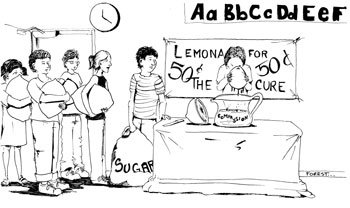Public office is a public trust
Ilustration by Forest Byrd
Government is a trust, and the officers of the government are trustees; and both the trust and the trustees are created for the benefit of the people.
Henry Clay, 1829
We’re all for elected officials learning to do their jobs well. School board members we cover frequently attend an annual conference put on by the New York State School Boards Association. They report back to their boards on what they have learned and we report on the costs the public pays.
Likewise, town officials frequently attend the annual Association of Towns convention. Town judges can get their required training there and other officials can learn valuable lessons that will help in running their towns.
But some officials in Rensselaerville stepped over the essential line of public trust this year. Eight of them traveled to New York City for the Association of Towns convention and some of them charged the taxpayers for things they shouldn’t have, like expensive cocktails at nightclubs.
The total cost to the town was close to $8,000 while the registration fees for the meeting totaled just $835.
A group of colorful letter-writers brought the matter to our attention. And they had fun with it:
“Now, while we can’t even understand why some of these attendees felt free to spend your money drinking alcoholic drinks such as $6.50 beers and $8.50 Bacardi rum on the rocks, we were really stymied by one thing.
“Where in the heck is the beach in Manhattan? There were charges of $9.50 for Sex on the Beach on some of their receipts. What in the dickens was this for?
“The first thought that crossed our inquisitive minds was, what a bargain! If only ex-Governor Spitzer knew this was available in his own hometown for that price, why would he travel all the way to Washington, D.C. and pay a whole lot more than that?
“He lost his job over that but your representatives are still hard at work for you, the taxpayers, so that idea couldn’t be right! More research was needed!
“We headed off to do our research on the Internet and, much to our immense relief, we have come up with the information to avoid a sex scandal by our representatives who live right here in our hometown of Rensselaerville, N.Y. We discovered that Sex on the Beach is actually an alcoholic drink containing peach schnapps and vodka. Whew, we wiped off our foreheads after learning that!”
Like many satirists, the Rensselaerville letter-writers paint with a broad brush. Our Hilltown reporter, Tyler Schuling, dug in to find the facts. After obtaining a stack of vouchers through a promptly-answered Freedom of Information Law request, he sifted through the receipts.
Some of the officials were fair and reasonable. Alfred Stettner, a planning-board member who attended, for example, charged the town $77 for his roundtrip train ticket and did not charge the town for lodging or food. The town’s lawyer, Joseph Catalano, included an itemized list of his expenses on his voucher: He spent $201 for his train and cab fares, parking, and meals.
The assessor Jeff Pine and his wife, councilwoman Sherri Pine, also submitted reasonable vouchers at $262 and $162 for transportation and meals.
However, the vouchers submitted by the four members of the Chase family were not so reasonable. G. Jon Chase, the town’s highway superintendent; his sons, Councilman Gary Chase and Bradley Chase, who serves on the town’s board of assessment review; and his son-in-law, Roger Gifford, a member of the zoning board, each submitted $400 in expenses.
That happens to be the exact amount that the town board voted to reimburse for.
Bradley Chase attached a note to his that says, “Other transportation, food, tips, etc. exceed the $400 allowance for the Association of Towns annual meeting.”
Richard Tollner, the town’s deputy superintendent, wrote on one of the vouchers: “Advise town board to have stipulation [of] $100 per day and no alcohol.”
Indeed.
It’s a shame town officials would have to be advised of this. They should know better.
We suggest the town board set a reasonable number of officials to attend every year; they can take turns if more than two or three want to go. And other guidelines should be set as well. The town footed a bill of $4,842 for six rooms for three nights at the Sheraton Hotel in Manhattan; if less expensive accommodations can’t be found, the conference-goers could at least share rooms to cut costs.
Rensselaerville is not a wealthy town. Its annual budget is $2 million. We’ve listened to the town board agonize over expenses for worthwhile goods and projects that cost less than the $8,000 spent on the conference. Volunteers raised money recently, all from private donations, to purchase a bus so the youth and the elderly in Rensselaerville would have ready transportation.
Maybe next year those who go to the convention could ride the bus and save the taxpayers’ plenty. Or Rensselaerville could learn from the neighboring town of Knox. The supervisor there told us that, to save money in recent years, Knox has sought out local training sessions for its officials. They get the training they need without the expensive hotels, gourmet meals, and Sex on the Beach.
We believe the four members of the Chase family who abused the public trust owe the townspeople they represent an explanation if not a refund. They are supposed to serve the public, not prey on it.
“The very essence of a free government,” said John Calhoun, “consists in considering offices as public trusts, bestowed for the good of the country, and not for the benefit of an individual or party.”
Those words are just as true today as they were in 1835.
Melissa Hale-Spencer, editor


